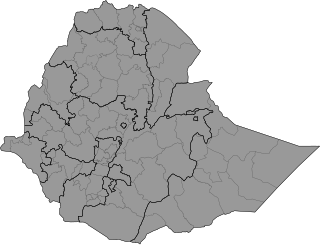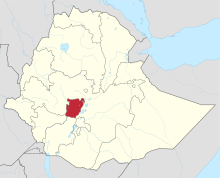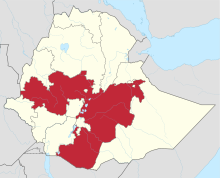
The government of Ethiopia is the federal government of Ethiopia. It is structured in a framework of a federal parliamentary republic, whereby the prime minister is the head of government. Executive power is exercised by the government. The prime minister is chosen by the lower chamber of the Federal Parliamentary Assembly. Federal legislative power is vested in both the government and the two chambers of parliament. The judiciary is more or less independent of the executive and the legislature. They are governed under the 1995 Constitution of Ethiopia. There is a bicameral parliament made of the 108-seat House of Federation and the 547-seat House of Peoples' Representatives. The House of Federation has members chosen by the regional councils to serve five-year terms. The House of Peoples' Representatives is elected by direct election, who in turn elect the president for a six-year term.
Amharic is an Ethiopian Semitic language, which is a subgrouping within the Semitic branch of the Afroasiatic languages. It is spoken as a first language by the Amharas, and also serves as a lingua franca for all other populations residing in major cities and towns in Ethiopia.
A demonym or gentilic is a word that identifies a group of people in relation to a particular place. Demonyms are usually derived from the name of the place. Demonyms are used to designate all people of a particular place, regardless of ethnic, linguistic, religious or other cultural differences that may exist within the population of that place. Examples of demonyms include Cochabambino, for someone from the city of Cochabamba; Tunisian for a person from Tunisia; and Swahili, for a person of the Swahili coast.

Oromo, historically also called Galla, which is regarded by the Oromo as pejorative, is an Afroasiatic language that belongs to the Cushitic branch. It is native to the Ethiopian state of Oromia and northern Kenya and is spoken predominantly by the Oromo people and neighboring ethnic groups in the Horn of Africa. It is used as a lingua franca particularly in the Oromia Region and northeastern Kenya.

Ethiopia is a federation subdivided into ethno-linguistically based regional states and chartered cities. This system of administrative regions replaced the provinces of Ethiopia in 1992.

The Somali Region, also known as Soomaali Galbeed and officially the Somali Regional State, is a regional state in eastern Ethiopia. Its territory is the largest after Oromia Region. The regional state borders the Ethiopian regions of Afar and Oromia and the chartered city Dire Dawa to the west, as well as Djibouti to the north, Somalia to the northeast, east and south; and Kenya to the southwest.

A wilayah (Arabic: وَلاية, romanized: walāya or wilāya, plural wilāyat, wilayat; Urdu and Persian: ولایت, romanized: velâyat; is an administrative division, usually translated as "state", "province" or occasionally as "governorate". The word comes from the Arabic root "w-l-y", "to govern": a wāli—"governor"—governs a wālāya, "that which is governed". Under the Caliphate, the term referred to any constituent near-sovereign state.

Y'all is a contraction of you and all, sometimes combined as you-all. Y'all is the main second-person plural pronoun in Southern American English, with which it is most frequently associated, though it also appears in some other English varieties, including African-American English, South African Indian English and Sri Lankan English. It is usually used as a plural second-person pronoun, but whether it is exclusively plural is a perennial subject of discussion.

Lithuania is now a country in the Baltic region of Europe.

Somalia is officially divided into 18 administrative regions. These are in turn subdivided into seventy-two districts

Ethiopia is administratively divided into four levels: regions, zones, woredas (districts) and kebele (wards). The country comprises 12 regions and two city administrations under these regions, plenty of zones, woredas and neighbourhood administration: kebeles. In addition to the Twelve federal states within the country, there are two federal-level city administrations in Addis Ababa and Dire Dawa.
The Qimant language is a highly endangered language spoken by a small and elderly fraction of the Qemant people in northern Ethiopia, mainly in the Chilga woreda in Semien Gondar Zone between Gondar and Metemma.
Ale is an Afro-Asiatic language spoken in southern Ethiopia in the administratively part of the "South Ethiopia Regional State" (SERS). It is part of the Dullay dialect cluster.
Komo is a Nilo-Saharan language spoken by the Kwama (Komo) people of Ethiopia, Sudan and South Sudan. It is a member of the Koman languages. The language is also referred to as Madiin, Koma, South Koma, Central Koma, Gokwom and Hayahaya. Many individuals from Komo are multilingual because they are in close proximity to Mao, Kwama and Oromo speakers. Komo is closely related to Kwama, a language spoken by a group who live in the same region of Ethiopia and who also identify themselves as ethnically Komo. Some Komo and Kwama speakers recognize the distinction between the two languages and culture, whereas some people see it as one "ethnolinguistic" community. The 2007 Ethiopian census makes no mention of Kwama, and for this reason its estimate of 8,000 Komo speakers may be inaccurate. An older estimate from 1971 places the number of Komo speakers in Ethiopia at 1,500. The Komo language is greatly understudied; more information is being revealed as researchers are discovering more data about other languages within the Koman family.

The Arbore are an ethnic group living in southern Ethiopia, near Lake Chew Bahir. The Arbore people are pastoralists. With a total population of 6,850, the Abore population is divided into four villages, named: Gandareb, Kulaama, Murale, and Eegude.

The Transitional Government of Ethiopia (TGE) was an era established immediately after the Ethiopian People's Revolutionary Democratic Front (EPRDF) seized power from the Marxist-Leninist People's Democratic Republic of Ethiopia (PDRE) in 1991. During the transitional period, Meles Zenawi served as the president of the TGE while Tamrat Layne was prime minister. Among other major shifts in the country's political institutions, it was under the authority of the TGE that the realignment of provincial boundaries on the basis of ethnolinguistic identity occurred. The TGE was in power until 1995, when it transitioned into the reconstituted Federal Democratic Republic of Ethiopia that remains today.
Ethnic federalism, multi-ethnic or multi-national federalism, is a form of federal system in which the federated regional or state units are defined by ethnicity. Ethnic federal systems have been created in attempts to accommodate demands for ethnic autonomy and manage inter-ethnic tensions within a state. They have not always succeeded in this: problems inherent in the construction and maintenance of an ethnic federation have led to some states or sub-divisions of a state into either breaking up, resorting to authoritarian repression, or resorting to ethnocracy, ethnic segregation, population transfer, internal displacement, ethnic cleansing, and/or even ethnicity-based attacks and pogroms.
The Oromo–Somali clashes flared up in December 2016 following territorial disputes between Oromia region and Somali region's Government in Ethiopia. Hundreds of people were killed and more than 1.5 million people fled their homes. The conflict ended in 2018.

The Prosperity Party is a ruling political party in Ethiopia that was established on 1 December 2019 as a successor to the Ethiopian People's Revolutionary Democratic Front by incumbent Prime Minister Abiy Ahmed.











































